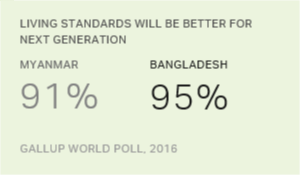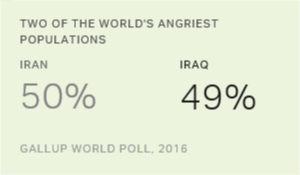Story Highlights
- Residents of Bangladesh, Myanmar and Vietnam are the most hopeful
- Residents of Taiwan and Hong Kong are the least optimistic
WASHINGTON, D.C. -- Majorities in most Asian economies surveyed in 2016, including some of the region's least-developed countries, expect that children today will have better living standards when they grow up than their parents did. This includes more than 90% of residents in poor countries such as Bangladesh and Myanmar.
| Better | Same | Worse | Don't know | |||||||||||||||||||||||||||||||||||||||||||||||||||||||||||||||||||||||||||||||||||||||||||||||||
|---|---|---|---|---|---|---|---|---|---|---|---|---|---|---|---|---|---|---|---|---|---|---|---|---|---|---|---|---|---|---|---|---|---|---|---|---|---|---|---|---|---|---|---|---|---|---|---|---|---|---|---|---|---|---|---|---|---|---|---|---|---|---|---|---|---|---|---|---|---|---|---|---|---|---|---|---|---|---|---|---|---|---|---|---|---|---|---|---|---|---|---|---|---|---|---|---|---|---|---|---|
| % | % | % | % | |||||||||||||||||||||||||||||||||||||||||||||||||||||||||||||||||||||||||||||||||||||||||||||||||
| Country | ||||||||||||||||||||||||||||||||||||||||||||||||||||||||||||||||||||||||||||||||||||||||||||||||||||
| Bangladesh | 95 | 2 | 2 | 2 | ||||||||||||||||||||||||||||||||||||||||||||||||||||||||||||||||||||||||||||||||||||||||||||||||
| Myanmar | 91 | 5 | 3 | 2 | ||||||||||||||||||||||||||||||||||||||||||||||||||||||||||||||||||||||||||||||||||||||||||||||||
| Vietnam | 88 | 8 | 3 | 1 | ||||||||||||||||||||||||||||||||||||||||||||||||||||||||||||||||||||||||||||||||||||||||||||||||
| Nepal | 79 | 10 | 5 | 6 | ||||||||||||||||||||||||||||||||||||||||||||||||||||||||||||||||||||||||||||||||||||||||||||||||
| Indonesia | 73 | 17 | 6 | 4 | ||||||||||||||||||||||||||||||||||||||||||||||||||||||||||||||||||||||||||||||||||||||||||||||||
| Cambodia | 70 | 8 | 16 | 6 | ||||||||||||||||||||||||||||||||||||||||||||||||||||||||||||||||||||||||||||||||||||||||||||||||
| India | 62 | 26 | 7 | 5 | ||||||||||||||||||||||||||||||||||||||||||||||||||||||||||||||||||||||||||||||||||||||||||||||||
| Philippines | 62 | 30 | 6 | 2 | ||||||||||||||||||||||||||||||||||||||||||||||||||||||||||||||||||||||||||||||||||||||||||||||||
| Thailand | 61 | 19 | 10 | 10 | ||||||||||||||||||||||||||||||||||||||||||||||||||||||||||||||||||||||||||||||||||||||||||||||||
| Singapore | 60 | 21 | 13 | 6 | ||||||||||||||||||||||||||||||||||||||||||||||||||||||||||||||||||||||||||||||||||||||||||||||||
| Mongolia | 59 | 20 | 9 | 12 | ||||||||||||||||||||||||||||||||||||||||||||||||||||||||||||||||||||||||||||||||||||||||||||||||
| Afghanistan | 56 | 23 | 13 | 9 | ||||||||||||||||||||||||||||||||||||||||||||||||||||||||||||||||||||||||||||||||||||||||||||||||
| Pakistan | 55 | 30 | 13 | 3 | ||||||||||||||||||||||||||||||||||||||||||||||||||||||||||||||||||||||||||||||||||||||||||||||||
| Hong Kong | 53 | 17 | 28 | 3 | ||||||||||||||||||||||||||||||||||||||||||||||||||||||||||||||||||||||||||||||||||||||||||||||||
| Taiwan | 41 | 13 | 39 | 7 | ||||||||||||||||||||||||||||||||||||||||||||||||||||||||||||||||||||||||||||||||||||||||||||||||
| Figures may not add to 100% because of rounding. | ||||||||||||||||||||||||||||||||||||||||||||||||||||||||||||||||||||||||||||||||||||||||||||||||||||
| Gallup World Poll, 2016 | ||||||||||||||||||||||||||||||||||||||||||||||||||||||||||||||||||||||||||||||||||||||||||||||||||||
The pace of economic progress explains much of the difference between opinions in countries at the top and bottom of the list. Countries at the top of the list, where residents are most optimistic about the next generation's standard of living, enjoyed strong gross domestic product (GDP) growth rates of over 6% last year. Their economies have seen dramatic improvements recently, aided by increased foreign investment and low labor rates. Bangladesh's economy, for example, has grown by more than 6% in 10 of the past 12 years.
However, among countries at the top of the list, current per capita income levels are low compared with those of other countries. According to the World Bank, Bangladesh ranked 145th in the world in terms of per capita income last year, and Myanmar ranked 146th. These are two of the world's least-developed countries, where people have relatively short life expectancies. Yet, residents in Bangladesh and Myanmar express great hope for rising living standards -- not because of their country's current level of development, but because of the positive trend and momentum of its development.
The opposite is apparent in several economies toward the bottom of the list. Taiwan, Hong Kong and Singapore are among the more advanced economies in the world and enjoy high per capita income levels. However, they have mature economies with saturated markets that face little upward potential. Although they have considerably more-developed economies than countries at the top of the list do, they have less room for growth -- and therefore seem less optimistic about their future generation seeing improved living standards.
Rate of Economic Progress
People's outlook on the economic conditions of their country aligns closely with their level of optimism for the future generation's standard of living. Residents of poor countries with fast-growing economies are more likely to say national economic conditions are "getting better" than are residents of wealthier countries with slow-growing economies.
| Getting better | Staying the same* | Getting worse | Don't know | |||||||||||||||||||||||||||||||||||||||||||||||||||||||||||||||||||||||||||||||||||||||||||||||||
|---|---|---|---|---|---|---|---|---|---|---|---|---|---|---|---|---|---|---|---|---|---|---|---|---|---|---|---|---|---|---|---|---|---|---|---|---|---|---|---|---|---|---|---|---|---|---|---|---|---|---|---|---|---|---|---|---|---|---|---|---|---|---|---|---|---|---|---|---|---|---|---|---|---|---|---|---|---|---|---|---|---|---|---|---|---|---|---|---|---|---|---|---|---|---|---|---|---|---|---|---|
| % | % | % | % | |||||||||||||||||||||||||||||||||||||||||||||||||||||||||||||||||||||||||||||||||||||||||||||||||
| Country | ||||||||||||||||||||||||||||||||||||||||||||||||||||||||||||||||||||||||||||||||||||||||||||||||||||
| Bangladesh | 78 | 9 | 10 | 4 | ||||||||||||||||||||||||||||||||||||||||||||||||||||||||||||||||||||||||||||||||||||||||||||||||
| Myanmar | 76 | 13 | 8 | 3 | ||||||||||||||||||||||||||||||||||||||||||||||||||||||||||||||||||||||||||||||||||||||||||||||||
| Cambodia | 71 | 5 | 19 | 5 | ||||||||||||||||||||||||||||||||||||||||||||||||||||||||||||||||||||||||||||||||||||||||||||||||
| Vietnam | 67 | 19 | 6 | 8 | ||||||||||||||||||||||||||||||||||||||||||||||||||||||||||||||||||||||||||||||||||||||||||||||||
| Philippines | 66 | 10 | 20 | 5 | ||||||||||||||||||||||||||||||||||||||||||||||||||||||||||||||||||||||||||||||||||||||||||||||||
| India | 51 | 33 | 12 | 5 | ||||||||||||||||||||||||||||||||||||||||||||||||||||||||||||||||||||||||||||||||||||||||||||||||
| Indonesia | 48 | 6 | 42 | 4 | ||||||||||||||||||||||||||||||||||||||||||||||||||||||||||||||||||||||||||||||||||||||||||||||||
| Nepal | 39 | 15 | 39 | 7 | ||||||||||||||||||||||||||||||||||||||||||||||||||||||||||||||||||||||||||||||||||||||||||||||||
| Singapore | 35 | 38 | 21 | 6 | ||||||||||||||||||||||||||||||||||||||||||||||||||||||||||||||||||||||||||||||||||||||||||||||||
| Thailand | 35 | 20 | 37 | 9 | ||||||||||||||||||||||||||||||||||||||||||||||||||||||||||||||||||||||||||||||||||||||||||||||||
| Pakistan | 28 | 36 | 36 | 0 | ||||||||||||||||||||||||||||||||||||||||||||||||||||||||||||||||||||||||||||||||||||||||||||||||
| Taiwan | 22 | 8 | 61 | 9 | ||||||||||||||||||||||||||||||||||||||||||||||||||||||||||||||||||||||||||||||||||||||||||||||||
| Afghanistan | 19 | 21 | 54 | 7 | ||||||||||||||||||||||||||||||||||||||||||||||||||||||||||||||||||||||||||||||||||||||||||||||||
| Hong Kong | 18 | 7 | 71 | 4 | ||||||||||||||||||||||||||||||||||||||||||||||||||||||||||||||||||||||||||||||||||||||||||||||||
| Mongolia | 17 | 16 | 60 | 6 | ||||||||||||||||||||||||||||||||||||||||||||||||||||||||||||||||||||||||||||||||||||||||||||||||
| *Volunteered response; figures may not add to 100% because of rounding. | ||||||||||||||||||||||||||||||||||||||||||||||||||||||||||||||||||||||||||||||||||||||||||||||||||||
| Gallup World Poll, 2016 | ||||||||||||||||||||||||||||||||||||||||||||||||||||||||||||||||||||||||||||||||||||||||||||||||||||
Again, Bangladesh and Myanmar top the list, with 78% and 76% in each country, respectively, saying their national economic conditions are getting better. They are followed by other lower-income countries with fast-growing economies. In general, residents' answers to this question track closely with the actual GDP growth performance reported by their country.
At the bottom of the list, 17% of Mongolians believe their economy is getting better. Mongolia enjoyed a natural resource boom several years ago, but the country was hit hard when commodity prices fell and then it poorly managed the resulting fallout. Now, after years of double-digit GDP growth, the country's growth rate is less than 5% per year.
People Predict Different Future for Themselves Than for Children
People's views about their own living standards differ from their outlook on future living standards for "today's children." For example, Filipinos are the most likely in the region to say their standard of living is getting better (81%), while 62% expect children's living standards to be better than those of their parents. Afghans are the least positive about their living standards, with 36% of the population saying their standard of living is getting better, while a slim majority (56%) see better conditions for children ahead.
This suggests that respondents think about their country's future development and the general direction their country is moving in when they are asked about "today's children." When asked about their own personal standard of living, they take into account a multitude of current individual factors, and economic conditions do not play as central a role.
Implications
People's predictions of whether children today will have a higher standard of living than that of their parents reflect their perceived potential for economic progress. They likely do not answer based on today's living standards, but rather on expectations for how improved the next generation's standard of living will be relative to today's.
Respondents from mature economies see little room for progress and are less hopeful that children will have a better standard of living than they do. In developing countries, while residents may not be as positive about their own living conditions, they are hopeful that children will have a better life than they do.
Gallup repeated this study in 2017 and will release results showing how each country's perceptions have changed.
Survey Methods
These results are based on interviews conducted from April 2016 to July 2016 across Asia with nationally representative samples of 1,000 to 3,000 adults, aged 15 and older, per country. For results based on these national samples of adults, the margins of sampling error are ±3.8 percentage points or less, at the 95% confidence level.
Learn more about how the Gallup World Poll works.
For more complete methodology and specific survey dates, please review Gallup's Country Data Set details.




